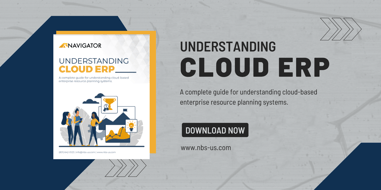There are typically three phases of a startup’s financial management journey.
First comes spreadsheets and Excel when a business is little more than an idea. Then comes bookkeeping and a small business accounting solution such as Quickbooks or Xero once operations begin. These are the phases that most founders anticipate.
But there’s a third phase, too. The third phase comes when a company is getting ready to scale or take on outside investment. At that point, a startup inevitably moves financial management to an enterprise resource planning solution (ERP), which thankfully now has become affordable for small businesses as a result of the cloud.
We recently spoke with startup consultant Gavin Maitland at Fleming CFO about the financial management journey for small businesses, and when a startup should approach this third step in the process.
Investor Visibility and GAAP Standards
In many ways, outside investors are like home buyers. They don’t want surprises.
“Investors are always concerned that there are undisclosed liabilities,” says Maitland. “They want to be sure everything is in place for the business, and standard processes are being followed for financials so they can check.”
Part of that is GAAP accounting standards and financial statements in the formats investors expect. This includes a statement of operations, balance sheet, statement of cash flows going back in the past and then also going forward in the future, et cetera. But it also includes the assurance that there’s the correct financial management infrastructure.
“ERP itself won't eliminate undisclosed liabilities because if you've got a liability you haven't disclosed in the balance sheet, it doesn't matter what kind of balance sheet you've got,” he notes. “But ERP shows them you've got a process in place and they can see it, and if they want to see the last 12 months of the balance sheets, they can. And if there's big fluctuation, then you get to explain that. Maybe you can, probably you can. But it lets them have this visibility to give them additional assurance.”
Manageable Reporting
There’s a gotcha that startups often face when they first seek outside investment, according to Maitland, one that often gets him hired: Startups might have basic financial accounting in place, but outside investment adds an extra level of reporting requirements that frequently overwhelm a startup.
“It is not just putting the books in order, but it is continually reporting. Because once you get an external investor on board, they want to see actual versus budget, actual versus forecast, actual versus re-forecast numbers every month or every quarter,” says Maitland. “It is a major change for a startup.”
The extra reporting is a change that really taxes and burdens a young startup unless it has an ERP in place to make these new reporting requirements easy and automatic, according to Maitland. Quickbooks is fine for a founder and a few employees, but it isn’t truly built for accommodating outside stakeholder requirements.
Actionable, Forward-Looking Financial Data
Startups usually have their financial accounts in order when they make the leap to small-business accounting software. But in the early QuickBooks stage of a startup’s evolution, financials are only minimally useful.
“They haven't got user-friendly financials,” says Maitland, and “they can't get any useful information. Their financials are about the past, so they don’t have a forward vision. And this forward vision is what a startup wants. QuickBooks is not answering the questions they're posing.”
Maitland says this is one of the strongest reasons that a growing startup should make the leap to ERP for financial management. When a startup is small enough that a founder can keep everything in his head, it is easy enough to make projections and track expenses. Basic cost codes and spitball numbers can be enough. But as a startup grows and gets beyond a founder, a business needs robust financial accounting software that better tracks spending and can model future business scenarios.
This leap from recording expenses to using financials for future planning is an important step for a growing startup, says Maitland, and it requires ERP.
Scalable Financial Infrastructure
As a startup grows, it also needs financial infrastructure that supports segregated duties, multiple locations or lines of business, and multi-currency.
“As the organization gets bigger and there are more people involved, an ERP gives you better segregation of duties so that an entry has to be approved by somebody else,” says Maitland. “And it works on multi-location better. QuickBooks isn't very good for multi-location. So if you've got two or three sites, like a manufacturing site that's away from your main office, you need the extra scale of an ERP for that.”
Then there are situations such as multi-currency.
“Doing a consolidation in two currencies, Excel will only take you some distance,” notes Maitland. “QuickBooks doesn't do that at all. So suddenly, you're talking about an ERP.”
There’s a time and a place for spreadsheets and basic small business accounting. Sometimes Maitland starts a business with Quickbooks. But as a startup grows, it begins to need more.
That’s why there are three phases in a startup’s financial management journey. Spreadsheets are for proof of concept. Small business accounting software is for when operations get serious. And at the point when a startup looks to scale, or take on outside investment, ERP is the final step in financial management. When a business gets an ERP in place, it is ready for serious growth.
For more on ERP, and to learn what it will take to get ERP set up for your business, contact one of our experienced ERP consultants at (801) 642-0123 or email us at info@nbs-us.com.








